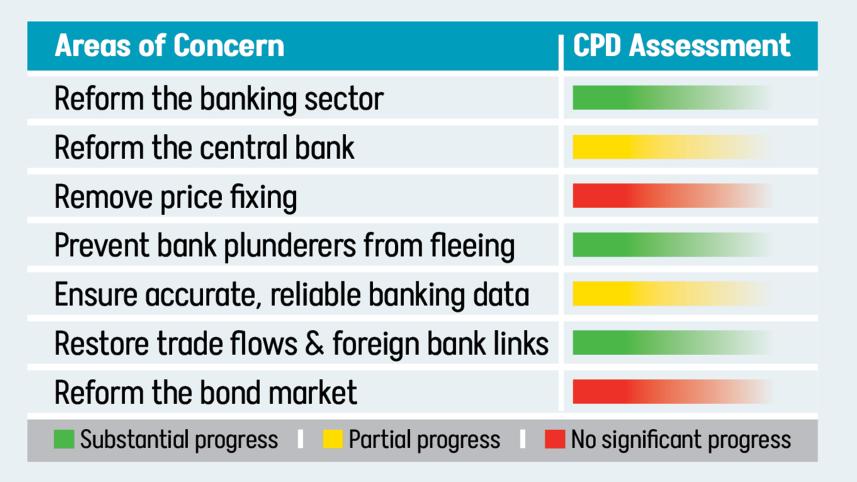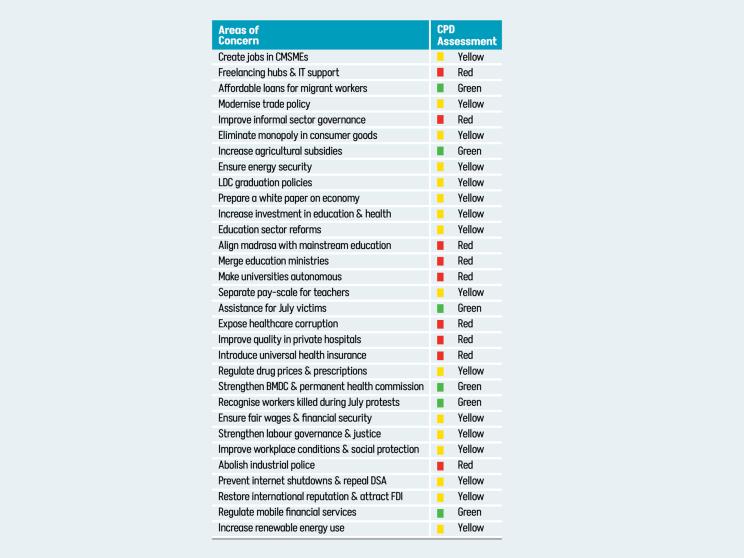Big win in banking, lost opportunities in investment, jobs

Despite progress in the banking sector, exchange rate, remittance, export, and reserves, the interim government has failed to curb high inflation, revive stagnant investment, or generate new jobs, the Centre for Policy Dialogue said yesterday.
It also underlined a lack of reforms in the education and healthcare sectors as major cause for concern.
"One year is a very short time, but the government had ample opportunity to bring positive change to the lives and livelihoods of the people," said Fahmida Khatun, CPD's executive director.
While presenting the think tank's report titled "365 Days of the Interim Government: Economy in Retrospect" at Lakeshore Hotel in Dhaka, she credited the government with averting an "impending economic disaster" through decisive actions in the banking sector.
However, she added, the original promise of building a discrimination-free society with employment at the centre of the economy had faltered without fresh investment.
"The movement aimed to create a discrimination-free society, with employment as the key focus, and an economy whose fruits of growth are shared by all. But investment was necessary for that. There was stagnation in investment, and Bangladesh must turn around from that stagnation," she said.
While significant local or foreign investment may not come during the interim tenure, the foundation must be laid now so that future elected governments can attract it immediately, she added.
Mustafizur Rahman, Distinguished Fellow at CPD, said the economy was at a critical juncture after the previous government's collapse, burdened by depleting reserves, sluggish growth, soaring inflation, rising unemployment, increasing non-performing loans, and falling remittances.
On August 14, 2024, after a student-led movement toppled the Awami League government, the CPD held a dialogue on macroeconomic, governance, and sectoral reform issues. Over a year later, it revisited those concerns to assess progress, identify gaps, and outline steps for stabilisation, recovery, and institutional improvement.
"We are witnessing some positive developments as efforts are underway to restore stability from a precarious situation," Mustafizur said.

GAINS AND GAPS
The CPD reviewed 38 major challenges faced over the past year, rating nine green for substantial progress, 18 yellow for partial progress, and 11 red for no significant initiative.
Progress was strongest in banking reforms, including reconstituting bank boards, freezing defaulters' assets, and passing the Bank Resolution Ordinance 2025.
Measures to prevent bank plunderers from fleeing, including with travel bans and frozen accounts, curbed capital flight and restored public trust.
Trade facilitation measures included liquidity support and scrapping LC margins for essential imports.
Support for migrant workers, such as collateral-free loans, revised migration rules, and better airport facilities, reflected commitment to remittance growth, though recruitment fraud and high migration costs persist.
A modest rise in agricultural subsidies bolstered food security, yet deeper modernisation is needed, the CPD observed.
Rehabilitation of protest victims through financial aid and health cards was notable, though psychological and vocational support would enhance outcomes.
In healthcare, strengthening the Bangladesh Medical and Dental Council is expected to improve accountability, and a permanent commission has been formed to address sectoral challenges.
Honouring deceased labourers through compensation was symbolic, but broader labour rights reforms are overdue.
Stopping technology-enabled fraud by regulating mobile financial services to ensure government funds reach rightful beneficiaries and prevent loot was another good initiative of the interim government, the CPD said.
Among the partial steps, the CPD mentioned central bank reforms, which saw the formation of a task force, but some legal amendments and policies remain pending. Banking data standards improved with global auditors and stricter NPL rules.
Bangladesh Bank ordered banks and non-banks to allocate 25 percent of loans to CMSMEs by 2025 and 27 percent by 2029, easing loan rules and creating dedicated departments. The Youth Entrepreneurship Policy 2025 offers training and financing, but weak enforcement and limited initiatives persist.
The Export Policy 2024 adds new sectors, revises incentives, promotes 3Rs (Reduce, Reuse, and Recycle) and green tech, and strengthens quality standards via TBT (Technical Barriers to Trade) measures, though implementation is uncertain.
Fair banking practices widened LC access for genuine importers, ending monopolies. Duty cuts stabilised prices and diversified supply before Ramadan, but monitoring is needed to prevent new monopolies.
The government launched the Support to Sustainable Graduation Project to guide Bangladesh's graduation from the LDC bracket through inclusive consultations, capacity-building, and research.
Despite forming committees and preparing a white paper on the economy, concrete implementation of recommendations remains lacking. Education and health budget increases fall short of international benchmarks.
The rate of RMG workers' wage hike rose from 5 percent to 9 percent, but other sectors saw no hikes. Labour law reforms and an Employment Injury Scheme pilot were launched, yet key laws and fair wage implementation remain lacking.
MISSED OPPORTUNITIES
The CPD flagged several areas of little or no progress. Among them, the bond market remains prone to fraud despite new guidelines, requiring comprehensive audits and stricter enforcement. The failure to establish freelancing hubs or integrate PayPal represents a missed opportunity for youth employment and foreign currency earnings.
While the labour information management system registration began for informal workers, the initiative alone cannot meet targeted objectives.
No steps have been taken to merge the two education ministries or grant universities autonomy from the education ministry and UGC. While the pay scale for government primary school head teachers was upgraded, no separate pay scale for teachers was introduced to attract or retain talent.
In healthcare, corruption allegations stalled the High Dependency Unit project at Shishu Hospital, with the World Bank withdrawing.
Despite Health Sector Reform recommendations against patient referrals to private hospitals, no action has been taken. The government lacks focus on introducing universal health insurance. Overall progress remains inadequate, according to the CPD analysis.
Speaking at the CPD event, BNP Standing Committee member Amir Khosru Mahmud Chowdhury said remittances rose automatically once money laundering, which flourished under the previous government, stopped. The earnings of the migrant workers were bought at higher rates to facilitate money laundering during the AL regime, he explained.
He, however, criticised the interim government for adopting a budget that mirrored its predecessor's, continuing mega projects instead of focusing on social sectors. "An interim government's role differs from that of an elected government. Elections must be held to ensure accountability," he said.
He added that excessive regulations discourage investment, citing the 19 approvals needed to open a restaurant. "Such over-regulation has created an oligarchy where only a few can do business," he said.
He also pledged that the BNP would invest 5 percent of GDP each in health and education, create one crore jobs in 18 months, and better integrate farmers, artisans, and craftspeople into the economy.
Labour and Employment Adviser Brig Gen (retd) M Sakhawat Hussain agreed that development is "not just about metro rails or expressways, it's about creating jobs".
He said entire institutions collapsed after the uprising and has yet to be rebuilt. Even the law enforcement and administration are still unsettled as they were caught in the grip of fascism. The interim government is trying to establish some kind of structure so that the next government can at least inherit a functioning framework, Hussain said. "A fragile structure will make it impossible for the new government to work effectively."
Emphasising police reform, the adviser said political interference in recruitment to the force will continue unless the police structure changes.
He warned that conflicts of interest persist in the labour sector when business leaders become MPs or ministers, as they stop advocating for workers.
Showkat Aziz Russell, president of the Bangladesh Textile Mills Association, said that despite an investment of $75 billion in the textile and ready-made garment sectors, with annual exports of $41 billion, the government has increased the corporate tax for textile mills and RMG from 15 and 12 percent to 37 percent.
"Besides, we are struggling to survive due to disruptions caused by extortionists. There is also a shortage of gas and electricity. If the government truly values these sectors, it should take action. I have not seen any wizardly steps in the last 365 days," he added.
Mahmud Hasan Khan, president of the Bangladesh Garment Manufacturers and Exporters Association (BGMEA), said garment factories are quietly shutting down every day. A clear indication of this is that BGMEA membership has dropped from 7,200 to only 3,000. The closures are due to unplanned factory expansion, policies of Bangladesh Bank, and the country's overall policy environment.
Referring to the constant policy changes in the country, Khan said, "The budget changes every year. At budget announcements, some policies are made, based on which entrepreneurs invest. But these policies are changed again the very next year."
Ruhin Hossain Prince, general secretary of the Communist Party of Bangladesh, said people cannot breathe a sigh of relief unless the economic distortions are corrected. "The government has failed to provide relief to ordinary people over the past year," he added.
One in every four people in the country suffers from multidimensional poverty, he said. "So, how can relief come?"
ASM Amanullah, vice-chancellor of the National University, said there is almost no connection between education and industry in the university's curriculum and examination system.
He pointed to factionalism among teachers, saying, "Among ten teachers, there are three groups. As a result, finding responsible teachers has become difficult."
Jimi Amir, a member of the Media Reform Commission, said implementation of the commission's recommendations has been stalled due to bureaucratic complications. "Bureaucrats did not want this, which is why no media reform initiatives have been undertaken so far," she said.



 For all latest news, follow The Daily Star's Google News channel.
For all latest news, follow The Daily Star's Google News channel.
Comments